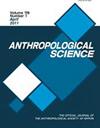The impact of oral contact and alloparenting on infant diarrhea in a hunter-gatherer society in Cameroon
IF 0.8
4区 社会学
Q3 EVOLUTIONARY BIOLOGY
引用次数: 0
Abstract
As this oral contact behavior common in infants Abstract Diarrhea is among the most common causes of death in children under five years of age. Infants are particularly at risk of ingesting pathogens directly or indirectly because of their frequent oral contact with a variety of objects. In hunter-gatherer societies, the widespread use of alloparenting, in which the infant is cared for by someone other than the biological parents, may play an important role in reducing the risk of infection from oral contact in infants. This study explored the relationship between infant oral contact behavior and diarrhea as well as the effects of alloparenting on infant oral contact behavior and diarrhea in hunter-gatherer societies. We conducted an interview on infant diarrhea and a 6-hour direct observation focused on oral contact and alloparenting of 6 infants (2–28 months) and 29 caregivers (≥4 years). During the observation period, the infants had frequent contact with objects with high risk of infection, with a median of 10.5 events (range, 0–49 events), and 50% ( n = 3) had diarrhea. In addition, infants mainly ate with their hands or from the hands of their caregivers, and there was no hand-washing behavior before eating, suggesting that hand-feeding may increase the risk of transmis sion of pathogens. Our results also showed that the number of caregivers prevented diarrhea in infants. Furthermore, alloparenting of the unique child-rearing patterns of hunter-gatherers contributed to block ing the infants’ contact with objects with high risk of infection. These study findings suggest that allopar enting may play a significant role in reducing the risks of infant diarrhea and infection by oral contact behavior, even when the risk of transmission of pathogens through oral contact among infants may be high, such as in hunter-gatherer societies.喀麦隆狩猎-采集社会中口腔接触和异种养育对婴儿腹泻的影响
摘要腹泻是五岁以下儿童最常见的死亡原因之一。由于婴儿经常与各种物体进行口腔接触,他们特别容易直接或间接摄入病原体。在狩猎采集社会中,广泛使用异种养育,即婴儿由亲生父母以外的人照顾,可能在减少婴儿因口腔接触感染的风险方面发挥重要作用。本研究探讨了狩猎采集社会婴儿口腔接触行为与腹泻的关系,以及异种养育方式对婴儿口腔接触行为和腹泻的影响。我们对6名婴儿(2-28个月)和29名照顾者(≥4岁)进行了关于婴儿腹泻的访谈和6小时的直接观察,重点是口腔接触和异位养育。观察期间,婴儿频繁接触感染高危物,中位数为10.5例(范围0 ~ 49例),50% (n = 3)发生腹泻。此外,婴儿主要用手或从照顾者手中进食,进食前没有洗手行为,这表明手喂养可能会增加病原体传播的风险。我们的研究结果还表明,照顾者的数量可以预防婴儿腹泻。此外,狩猎采集者独特的育儿模式也有助于阻止婴儿接触具有高感染风险的物体。这些研究结果表明,即使在婴儿之间通过口腔接触传播病原体的风险可能很高的情况下,例如在狩猎采集社会,施用同种异体药物可能在降低婴儿腹泻和通过口腔接触感染的风险方面发挥重要作用。
本文章由计算机程序翻译,如有差异,请以英文原文为准。
求助全文
约1分钟内获得全文
求助全文
来源期刊

Anthropological Science
生物-进化生物学
CiteScore
1.50
自引率
0.00%
发文量
7
审稿时长
>12 weeks
期刊介绍:
Anthropological Science (AS) publishes research papers, review articles, brief communications, and material reports in physical anthropology and related disciplines. The scope of AS encompasses all aspects of human and primate evolution and variation. We welcome research papers in molecular and morphological variation and evolution, genetics and population biology, growth and development, biomechanics, anatomy and physiology, ecology and behavioral biology, osteoarcheology and prehistory, and other disciplines relating to the understanding of human evolution and the biology of the human condition.
 求助内容:
求助内容: 应助结果提醒方式:
应助结果提醒方式:


